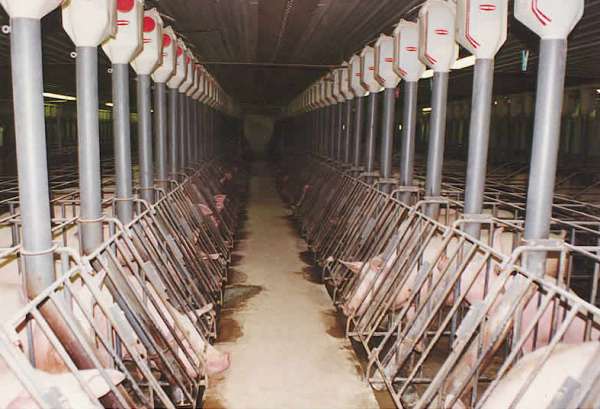 As the world panics about swine flu there is surprisingly little talk of the cause of this latest livestock endemic, writes Julia Stephenson.
As the world panics about swine flu there is surprisingly little talk of the cause of this latest livestock endemic, writes Julia Stephenson.
The infamous Smithfield Foods, a billion pound US food conglomerate, has made its fortune by buying farms in the US, Mexico and around the world, turning them into vast pig factories.
Each pig factory puts 10 family farmers out of business, replacing high-quality agricultural jobs with three or four hourly wage workers in degrading positions that are among the lowest-paid and most dangerous in the US. Because the animals are given almost no husbandry, as few as two workers may tend a factory of 10,000 pigs. Conditions are so miserable that employees seldom endure these jobs for more than a few months.
Inside these places thousands of pigs are crammed together in darkened sheds where they spend their lives covered in filth on concrete floors. In such conditions disease can spread rapidly. Pig waste falls through slats into a basement, where it is periodically flushed into giant outdoor pits called lagoons. This lethal slurry contains nearly 400 dangerous substances while antibiotic residues foster the growth of deadly ‘super bugs’ – disease organisms that are immune to human antibiotics.
In much of the world it is common for a pregnant sow to be kept in a sow stall (also called a gestation crate) for the whole of her 16 week gestation period. A sow stall is a metal crate or cage, usually with a bare slatted floor, which is so narrow that the sow cannot turn around and can only stand up and lie down with difficulty.
Sow stalls are illegal in Sweden and the UK. From 2013, they will be banned across the EU, except for the first 4 weeks of gestation. They are being phased out in certain states in the US and in New Zealand and Australia. A number of food producing companies are starting to phase them out voluntarily on animal welfare grounds, due to consumer pressure.
A bare sow stall prevents nearly all natural activity and interaction with other pigs. Scientific research shows that gestation crates cause physical and psychological suffering to sows, including lameness due to weaker bones and muscles, abrasion injuries, cardiovascular problems, digestive problems and urinary tract problems.
Sow stalls also increase abnormal behaviour such as sham chewing and bar-biting, indicating severe frustration and stress, and sows in crates can exhibit behaviour likened to clinical depression.
Feed is often restricted during pregnancy, causing chronic hunger and increasing the level of frustration.
Within a couple of weeks, the sow is inseminated again (often artificially) and starts her next pregnancy in a sow stall. Commercial sows normally produce just over 2 litters a year with around 10-12 piglets per litter. She has a breeding lifetime of about 3 years before being replaced and sold for slaughter.
Farrowing crates also severely restrict the sow’s movement and frustrate her strong motivation to build a nest before giving birth. They prevent the sow from being able to get away from her piglets, for example if they bite her teats. It is common for piglets to have their teeth cut down or clipped, without anaesthetic, to minimise biting injuries.
Buddhism teaches the principle of cause and effect. Today we can see that the cause of mistreating farm animals is creating the effect of sickness and death in humans.Compassion in World Farming has previously assessed the role of factory farming in the development and spread of avian influenza and found that the high densities on many chicken farms have been a significant contributing factor. Transport of farm animals over long distances may also contribute to the spread of diseases such as foot and mouth. According to experts, the rapid dissemination of the 1998 swine flu outbreak in the US was a result of long-distance live animal transport.
It is up to us, the consumer, to stop the tide of disease and cruelty and give up, or cut down on eating meat, or at the very least insist on insist on British free-range or organic. And by joining an effective campaigning organisation like Compassion in World Farming we can do even more to create healthy and humane conditions in our farms.
